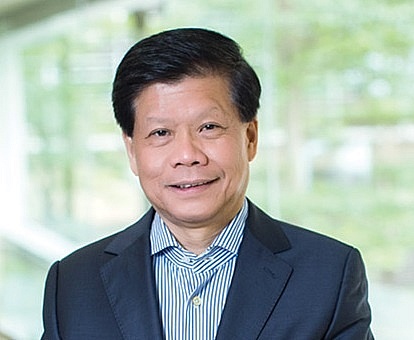NTU bringing research and innovation to Vietnam
 |
| Prof. Lam Khin Yong, senior vice-president at Nanyang Technological University |
How do you assess the policies and regulations to encourage partnerships between the private sector and universities, particularly with Nanyang Technological University, Singapore (NTU Singapore)?
From a research perspective, there are two important factors which resulted in the rapid growth of NTU and cooperation with the private sector.
Firstly, we brought in top faculty teams from all over the world to lead our research, which allowed existing faculty and students to work with and learn from the best. NTU is a magnet for top talent, with programmes in place to attract not only established academics but bright, up-and-coming researchers with great potential.
Secondly, we made the conscious move to work with industry partners worldwide, as we understand the importance of translating our research in the lab into commercial outcomes with societal impact.
How has industry-university collaboration in research been shaped, and how can this contribute to the socioeconomic development of the country?
NTU attracts a host of companies such as Alibaba, HP, Volvo, Delta Electronics, Continental AG, and Singtel, collaborating in AI, data science, robotics, smart transportation, computing, personalised medicine, healthcare, and clean energy. British engineering firm Rolls-Royce maintains its largest university engagement worldwide via a corporate lab at NTU.
In addition, the world’s first full-size, autonomous electric bus developed in partnership with Volvo has received global acclaim.
The main strategic model we use when it comes to research collaborations is the triple helix framework, a three-prong approach involving the university, public agencies, and the industry partner. This model of working which involves a co-funding approach helps maintain the research funding stream and NTU’s competitive annual research funding.
The industry research collaboration also allows companies to tap into student researchers at PhD, masters, and undergraduate levels and allows the companies to access this trained manpower upon their graduation.
Most importantly, we have also set up a robust industry partnership ecosystem within NTU, where we offer multiple collaboration models with companies, which benefits the industry partners as well as our faculty, researchers and students.
What are the key actions at NTU to motivate innovation, support students’ ideas for research, and improve the commercialisation of industrial products?
Students interested in inventions and startups have many opportunities to pick up relevant skills and gain funding support. The university has labs at schools, “Making and Tinkering” courses, collaboration projects with industry partners, and entrepreneurship courses. Students can also do internships at technology-based startups in global innovation hotspots.
NTUitive, our innovation and enterprise company, captures value from research breakthroughs by bringing patents and technologies to market and assisting faculty and students to set up new companies.
NTUitive actively establishes partnerships overseas and leverages the Global Innovation Alliance - an initiative by Enterprise Singapore and the Singapore Economic Development Board - connections with major innovation hubs around the world. The Nanyang Technopreneurship Centre, our education arm for innovation and enterprise, runs the NTU Overseas Entrepreneurship Programme, which provides students with internship opportunities in innovation hotspots worldwide.
In April, we launched two new labs under the EcoLabs Centre of Innovation for Energy to help energy startups make the leap from research and development into commercialisation through industry expertise, mentorship, and test-bedding.
Which policies from the Singaporean government, and from NTU, have helped woo and retain talents?
An important element of succession planning is to attract, develop, and retain talent. The NTU Leadership Academy programme was launched in 2015 to equip faculty members for leadership roles. Graduates from the programme currently make up 41 per cent of our academic appointments.
In 2019, NTU established a new mechanism to recognise and reward faculty for their accomplishments through newly-created term professorships. And as of 2021, NTU has awarded 76 chair professorships under this new initiative.
How has NTU collaborated with Vietnamese agencies and firms?
We developed the NTUit programme – the export version of our innovation training, for early-stage innovators to validate their customer segments, find product-market fit, and build a financially sustainable business through an experiential learning process.
The NTUit in Vietnam offers alumni, corporates, universities, government officials, and entrepreneurs in Vietnam the opportunity to be involved in related expansion activities.
In addition, NTUitive has been contracted by the Japan International Cooperation Agency to pilot a programme in Ho Chi Minh City and groom around 30 new startups that will scale up, raise funds, and generate a higher portfolio valuation and investment returns for Vietnamese stakeholders.
The NINJA Accelerator programme in Ho Chi Minh City was also launched in 2020 with three key Vietnam ecosystem partners: Saigon Innovation Hub, Vietnam National University Information Technology Park, and Saigon Hi-tech Park Incubation Centre.
We also support Vietnamese students, made possible through the generosity of donors. In 2019, Vingroup made a S$5 million ($3.63 million) gift to NTU to establish Vingroup Graduate Scholarships for Vietnamese students pursuing postgraduate degrees at NTU.
What the stars mean:
★ Poor ★ ★ Promising ★★★ Good ★★★★ Very good ★★★★★ Exceptional
Related Contents
Latest News
More News
- State corporations poised to drive 2026 growth (February 03, 2026 | 13:58)
- Why high-tech talent will define Vietnam’s growth (February 02, 2026 | 10:47)
- FMCG resilience amid varying storms (February 02, 2026 | 10:00)
- Customs reforms strengthen business confidence, support trade growth (February 01, 2026 | 08:20)
- Vietnam and US to launch sixth trade negotiation round (January 30, 2026 | 15:19)
- Digital publishing emerges as key growth driver in Vietnam (January 30, 2026 | 10:59)
- EVN signs key contract for Tri An hydropower expansion (January 30, 2026 | 10:57)
- Vietnam to lead trade growth in ASEAN (January 29, 2026 | 15:08)
- Carlsberg Vietnam delivers Lunar New Year support in central region (January 28, 2026 | 17:19)
- TikTok penalised $35,000 in Vietnam for consumer protection violations (January 28, 2026 | 17:15)

 Tag:
Tag:




















 Mobile Version
Mobile Version